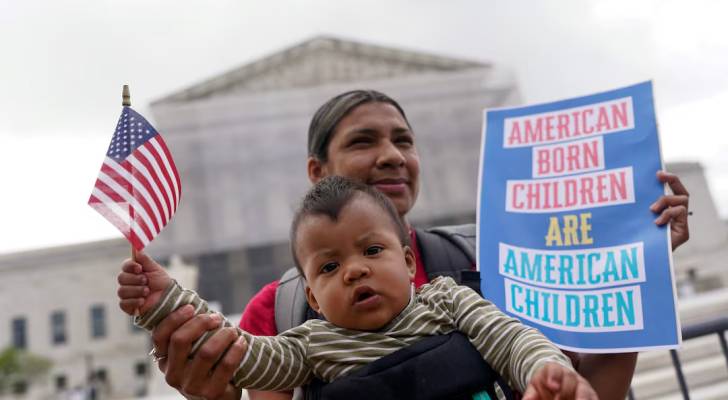US Supreme Court debates Trump's birthright citizenship executive order
US Supreme Court convened Thursday, May 15, to hear oral arguments in a landmark case challenging President Donald Trump’s executive order aimed at restricting birthright citizenship — a constitutional guarantee rooted in the 14th Amendment.
The high-profile case marks the first major legal test of Trump’s second-term immigration policies and has sparked intense debate over executive power, judicial authority, and the future of citizenship in the United States.
Signed on January 20, 2025, the executive order seeks to deny automatic citizenship to children born in the US to parents who are undocumented immigrants or temporary visitors. This challenges the long-standing interpretation of the 14th Amendment’s Citizenship Clause, ratified in 1868, which states: “All persons born or naturalized in the United States, and subject to the jurisdiction thereof, are citizens of the United States.”
The order has been blocked by nationwide injunctions issued by federal judges in Maryland, Massachusetts, and Washington state, who ruled it likely unconstitutional.
Thursday’s arguments focused not only on the constitutionality of the order but also on a procedural issue: whether lower courts have the authority to issue nationwide injunctions halting presidential policies across the country. According to The Washington Post, justices wrestled with the balance of power between the executive and judicial branches, with the Trump administration arguing that such injunctions create an “unfair legal playing field” for the government.
US Solicitor General D. John Sauer, representing the Trump administration, argued that the 14th Amendment’s Citizenship Clause was primarily intended to apply to children of former slaves, not those born to undocumented immigrants. “Critically, Wong Kim Ark did not address the question of whether children born to individuals who are unlawfully present in the United States qualify for birthright citizenship,” Sauer said, referencing the 1898 Supreme Court ruling that affirmed birthright citizenship for a child of lawful permanent residents.
He further contended that Article III of the Constitution prohibits lower courts from issuing universal injunctions and urged justices to limit rulings to the plaintiffs in the cases.
The Court’s liberal justices, led by Justice Sonia Sotomayor, sharply questioned Sauer’s claims. “If even the Supreme Court doesn’t have that right, and thus invites hundreds of thousands of lawsuits, what are we buying into?” Sotomayor asked, pointing to the practical challenges of requiring individual plaintiffs to separately challenge the order. Justice Elena Kagan echoed these concerns, suggesting that Sauer’s position could effectively bar courts from ruling the executive order unconstitutional, according to report puplished on CNBC.
Conservative justices, including Clarence Thomas — who opened questioning — focused more on the issue of nationwide injunctions. A ruling limiting their use could significantly reduce federal judges’ ability to block Trump’s policies, reshaping the judiciary’s role in checking executive actions, noted The New York Times. Such a decision might allow the birthright citizenship order to take effect in parts of the country, creating a patchwork of citizenship laws.
Legal experts and advocates highlighted the historical importance of the case. New Jersey Attorney General Matthew Platkin, whose office is involved in one of the lawsuits, told USA Today, “Birthright citizenship was enshrined in the Constitution in the wake of the Civil War, is backed by a long line of Supreme Court precedent, and ensures that something as fundamental as American citizenship cannot be turned on or off at the whims of a single man.” The 1898 Wong Kim Ark decision and a 1940 statute codifying birthright citizenship were cited as strong precedents opposing the executive order.
Critics, including immigrant rights groups, expressed alarm over the policy’s potential impact. CNN reported fears among pregnant immigrant parents worried their children could be denied citizenship and stigmatized as “outcasts.” Protests outside the Supreme Court Thursday underscored the emotional stakes, with demonstrators holding signs opposing the order, according to CNBC.
The Trump administration framed the issue as a matter of national sovereignty. In a social media post Thursday morning, Trump wrote, “Birthright citizenship was not meant for people taking vacations to become permanent citizens of the United States of America, and bringing their families with them, all the time laughing at the ‘suckers’ that we are!” He has also argued the policy is necessary to deter illegal immigration, though most legal experts cited by the BBC say an executive order cannot override a constitutional amendment.
The Supreme Court’s decision, expected in the coming weeks, could have wide-reaching consequences. A ruling limiting nationwide injunctions could embolden the Trump administration to pursue other controversial policies with less judicial resistance, NBC News reported.
Conversely, a decision affirming the injunctions would reinforce the judiciary’s role as a check on executive power and uphold the traditional interpretation of birthright citizenship.




